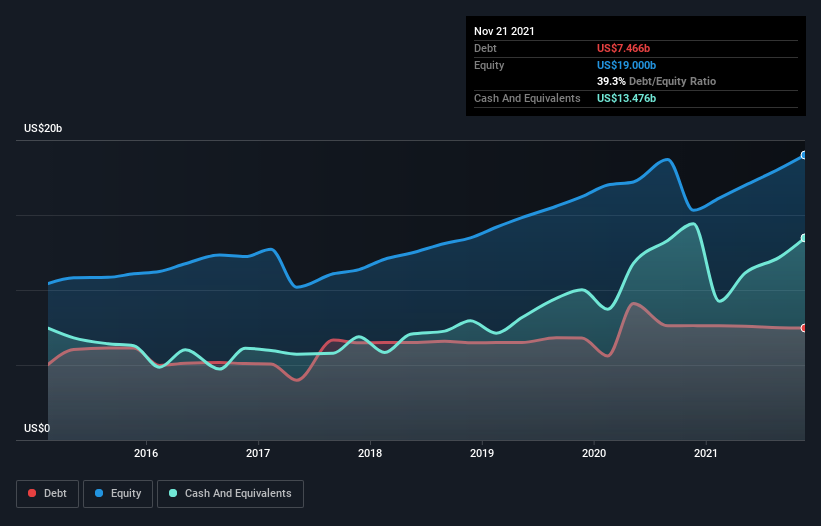Costco Wholesale (NASDAQ:COST) Could Easily Take On More Debt
Legendary fund manager Li Lu (who Charlie Munger backed) once said, 'The biggest investment risk is not the volatility of prices, but whether you will suffer a permanent loss of capital.' It's only natural to consider a company's balance sheet when you examine how risky it is, since debt is often involved when a business collapses. As with many other companies Costco Wholesale Corporation (NASDAQ:COST) makes use of debt. But the more important question is: how much risk is that debt creating?
When Is Debt Dangerous?
Debt and other liabilities become risky for a business when it cannot easily fulfill those obligations, either with free cash flow or by raising capital at an attractive price. In the worst case scenario, a company can go bankrupt if it cannot pay its creditors. However, a more frequent (but still costly) occurrence is where a company must issue shares at bargain-basement prices, permanently diluting shareholders, just to shore up its balance sheet. Having said that, the most common situation is where a company manages its debt reasonably well - and to its own advantage. The first step when considering a company's debt levels is to consider its cash and debt together.
View our latest analysis for Costco Wholesale
What Is Costco Wholesale's Net Debt?
The chart below, which you can click on for greater detail, shows that Costco Wholesale had US$7.47b in debt in November 2021; about the same as the year before. But on the other hand it also has US$13.5b in cash, leading to a US$6.01b net cash position.
How Healthy Is Costco Wholesale's Balance Sheet?
We can see from the most recent balance sheet that Costco Wholesale had liabilities of US$33.3b falling due within a year, and liabilities of US$11.8b due beyond that. Offsetting this, it had US$13.5b in cash and US$1.93b in receivables that were due within 12 months. So it has liabilities totalling US$29.7b more than its cash and near-term receivables, combined.
Since publicly traded Costco Wholesale shares are worth a very impressive total of US$216.8b, it seems unlikely that this level of liabilities would be a major threat. But there are sufficient liabilities that we would certainly recommend shareholders continue to monitor the balance sheet, going forward. Despite its noteworthy liabilities, Costco Wholesale boasts net cash, so it's fair to say it does not have a heavy debt load!
In addition to that, we're happy to report that Costco Wholesale has boosted its EBIT by 31%, thus reducing the spectre of future debt repayments. There's no doubt that we learn most about debt from the balance sheet. But it is future earnings, more than anything, that will determine Costco Wholesale's ability to maintain a healthy balance sheet going forward. So if you're focused on the future you can check out this free report showing analyst profit forecasts.
Finally, a company can only pay off debt with cold hard cash, not accounting profits. While Costco Wholesale has net cash on its balance sheet, it's still worth taking a look at its ability to convert earnings before interest and tax (EBIT) to free cash flow, to help us understand how quickly it is building (or eroding) that cash balance. During the last three years, Costco Wholesale generated free cash flow amounting to a very robust 85% of its EBIT, more than we'd expect. That positions it well to pay down debt if desirable to do so.
Summing up
While Costco Wholesale does have more liabilities than liquid assets, it also has net cash of US$6.01b. And it impressed us with free cash flow of US$5.8b, being 85% of its EBIT. So is Costco Wholesale's debt a risk? It doesn't seem so to us. There's no doubt that we learn most about debt from the balance sheet. However, not all investment risk resides within the balance sheet - far from it. For instance, we've identified 1 warning sign for Costco Wholesale that you should be aware of.
When all is said and done, sometimes its easier to focus on companies that don't even need debt. Readers can access a list of growth stocks with zero net debt 100% free, right now.
Have feedback on this article? Concerned about the content? Get in touch with us directly. Alternatively, email editorial-team (at) simplywallst.com.
This article by Simply Wall St is general in nature. We provide commentary based on historical data and analyst forecasts only using an unbiased methodology and our articles are not intended to be financial advice. It does not constitute a recommendation to buy or sell any stock, and does not take account of your objectives, or your financial situation. We aim to bring you long-term focused analysis driven by fundamental data. Note that our analysis may not factor in the latest price-sensitive company announcements or qualitative material. Simply Wall St has no position in any stocks mentioned.

 Yahoo Finance
Yahoo Finance 
